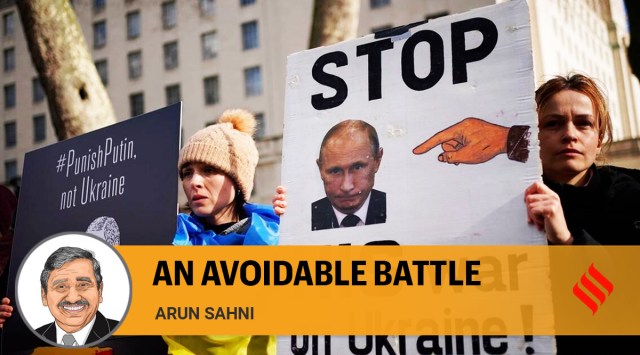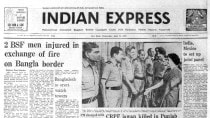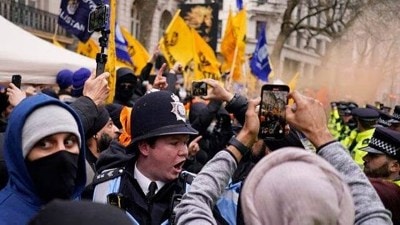- India
- International
Why the West should focus on China
Whatever the outcome of the Ukraine conflict, it heralds a transformation of the current world order
 Whatever the outcome of this East-West conflict, it heralds a transformation of the current world order. (Photo: AP)
Whatever the outcome of this East-West conflict, it heralds a transformation of the current world order. (Photo: AP)The Russian offensive on Ukraine on the night of February 23-34 shocked the world. It was unexpected, surprising and avoidable. Vladimir Putin’s decision to go on the offensive, whatever the rationale, has only one end — a regime change. The longer the war lasts, the greater the number of casualties and the more severe the world’s response towards Russia. This situation could have been circumvented by a more rational approach towards Russia’s security concerns. A one-liner from the US, saying that NATO’s expansion will address Russian security interests will provide the impetus to end the current conflict.
🗞️ Subscribe Now: Get Express Premium to access the best Election reporting and analysis 🗞️
The clouds of war were gathering for over a month, as there was concern over the buildup of Russian military forces close to the borders with Ukraine, followed up by military exercises with Belarus. The trigger for the conflict has been the rise of anti-Russia/Putin and pro-Europe lobby in Ukraine, led by President Volodymyr Zelenskyy and with the tacit support of the US and the West.
The situation became deeply polarised after battle lines were drawn in 2015, with Ukraine’s breakaway Donbas region seeking a merger with Russia, after Crimea’s unification with the latter. In addition, the condescending attitude of the US and Europe towards Russian interests was — and continues to be — a major irritant and that negatively impacts Russia and Putin’s self-respect. Russia has, over the years, quite correctly questioned the relevance of NATO — a grouping of the Cold War era — and its expansion eastwards. For instance, NATO included the Commonwealth of Independent States (CIS) countries of Georgia and Ukraine, earlier part of the Soviet Union, in its “Partnership for Peace” programme, despite Russian objections.
All this brings to the fore the biggest unanswered question: Why is the US doggedly pursuing Cold War-era strategies against Russia, when the demon on the block is China? Whatever the outcome of this East-West conflict, it heralds a transformation of the current world order. Geopolitics will never be the same, especially with Germany and Japan announcing militarisation initiatives, polarisation in Europe and the strengthening of the anti-US nexus of China- Russia-Turkey-Iran.

It is too early to draw lessons but a matter of concern is that once again, the attention of the US and the West has been diverted from China, the main adversary, to a war that should not have taken place. China has been learning lessons from the US’s functioning and handling of global challenges, to put it simplistically, to see “what it takes to be a leading world power”. This is apparent from China’s changing focus towards modernisation and force structuring since 2004, outcomes of the lessons learnt from the US-supported conflicts in both the Gulf Wars, and invasions and conflicts in Iraq, Libya, Afghanistan and the “colour revolutions” of the 1990s. This is reflected in the White Papers issued periodically by China enunciating its military strategy. So, there has been a transition from “winning local wars in conditions of modern technology, particularly high technology” in 1993 to “winning local wars under conditions of informationisation” in 2004 and currently, calls for “winning informationised local wars” since 2015.
China is now once again witness to the inaction and vulnerabilities of the US and developed world in the face of adversity. In the current conflict, the ineptitude of the US/NATO to support Ukraine with “boots on the ground” is bound to embolden China in its nefarious design to annex Taiwan. This could also lead to increased hostility by China in the resolution of land disputes with the neighbouring countries, as well as in the South and East China seas. Though the nuclear alert issued by Russia seems to be overkill, it highlights the danger of the indiscriminate use of nuclear resources by autocratic leadership. It needs to be noted with concern that the US, despite repeated efforts, has been unable to get China to come aboard nuclear arms limitation agreements.
There are, therefore, more urgent priorities for world peace than the proverbial “rubbing Russia’s nose in the dust” such as mutually-accepted principles for the exploitation of niche and emerging technologies, militarisation of space, and the robustness of the current international institutions.
Another issue of concern is racial double standards and prejudice. There is a simmering feeling of “White supremacy” — whether in the remarks of journalists in the Western media or implied in the statements of leading political figures from Europe. Maybe the harassment of Indian students fleeing Ukraine is a reflection of this malaise.
For India, the greatest lesson is that it will have to meet the Chinese challenge on its own. There is no likelihood of the US or any other nation getting involved in India’s fight with China. Let us focus on atmanirbharta in all its dimensions.
This column first appeared in the print edition on March 14, 2022 under the title ‘An Avoidable Battle’. The writer is a former Indian Army Commander and former Indian military diplomat in Moscow
EXPRESS OPINION
More Explained
Apr 25: Latest News
- 01
- 02
- 03
- 04
- 05












































